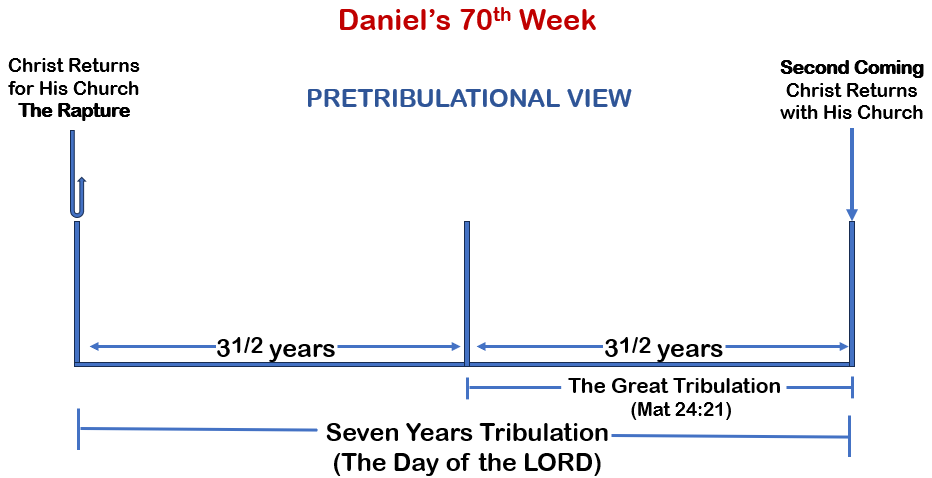I have seen people referring to those who do not agree with their view of the rapture as “heretics”. I saw one book written by a man with a divinity degree refer to an apposing view as “heresy.” How sad. I could understand if it was an issue of salvation or the divinity of Christ – some core doctrine of Christianity but when it comes to end times events it is hard to imagine that someone would be so divisive and unkind. Got Questions Ministries makes an important point. They say that “Scripture does not expressly teach one view over another, and that is why we have diversity of opinion concerning the end times and some variety on how the related prophecies should be harmonized.”1What are the strengths and weaknesses of the midtribulational view of the rapture (midtribulationism)?https://www.gotquestions.org/midtribulationism.html I found these quotes on another website: George Ladd closes The Blessed Hope by declaring: “Neither pretribulationism nor posttribulationism should be made a ground of fellowship, a test of orthodoxy, or a necessary element in Christian doctrine” (167). Douglas Moo concludes: “I cannot, indeed must not, allow this conviction to represent any king of barrier to full relationships with others who hold differing convictions …” (211). Even William Kimball hopes that “our essential unity and fellowship in Christ should never be severed or undermined because of our differences on prophetic points” (181). Such mutual respect must be continually encouraged.2Kept From The Hour – By Gerald Stanton. Chapter 13. The Rapture Debate. https://www.raptureready.com/kept-hour-13/ I encourage you to go to this article for teaching on this issue. W. K. Harrison noted, “there is serious honest disagreement among Christians who agree in their loyalty to the Lord Jesus Christ and His Word, the Bible, as to whether the rapture occurs before or after the great tribulation.”3William K. Harrison, “The time of the rapture as indicated in certain scriptures. [1],” Biblotheca Sacra
114, no. 456 (October 1, 1957): p. 316. I agree with, John Hepp: “The Rapture question should not be allowed to divide evangelical believers in their service and communion. The order of final events is interesting but not essential. The Rapture question should not take the place of seeking “his kingdom and his righteous-ness” (Matt. 6:33). The Lord did not tell us to pray for the Rapture but for the kingdom to come (Matt. 6:10). Whether we escape the Tribulation or not, our hope is His coming kingdom.”4FIRST & SECOND THESSALONIANS Study Guide by World Wide LIT (Leadership Instruction & Training). Page 98. https://www.kingdominbible.com/new-testament/acts-and-general-epistles/1-2-thessalonians/ We would all do well to abide by Paul’s admonition in Ephisians 4:31-32: “Let all bitterness, and wrath, and anger, and clamour, and evil speaking, be put away from you, with all malice: And be ye kind one to another, tenderhearted, forgiving one another, even as God for Christ’s sake hath forgiven you.”
A. Pre-Tribulational Rapturism
This is by far, the most common viewpoint in America today. It’s roots can be traced back to the Plymouth Brethren in 1830, although it did not really become prevalent in America until the early 1900’s. Pre-trib teaches this:
- The final 7 year period of the world is called “the Tribulation.”
- The last 3.5 years are called the “Great Tribulation.”
- The entire 7 year period is considered the wrath of God or the Day of the Lord.
- Since the church is not destined for God’s wrath, then the church is raptured prior to the 7 year period.
- The rapture is considered to be a silent and “any moment” event.
 I replicated the above graphic from Dr. David Jeremiah. See here https://davidjeremiah.blog/the-revelation-prophecy-timeline for more on the pretribulational view by Dr. Jeremiah.
I replicated the above graphic from Dr. David Jeremiah. See here https://davidjeremiah.blog/the-revelation-prophecy-timeline for more on the pretribulational view by Dr. Jeremiah.
B. Mid-Tribulation Rapturism
This view is even more recent than pre-trib, becoming popular in 1941. This view believes:
- The final 7 year period of the world is called “the Tribulation.”
- The last 3.5 years are called the “Great Tribulation.”
- The last 3.5 years are considered the wrath of God or the Day of the Lord.
- Since the church is not destined for God’s wrath, then the church is raptured at the mid-way point.
C. Post-Tribulation Rapturism
Post-trib was by far the most popular opinion during the time of the reformation, but cannot be traced to a specific starting point. There are a lot of variations on this view but in its classic sense post-tribbers believe:
- The church must endure the entire 7 year period, to be raptured at the end of the tribulation.
- God will protect his children through His wrath.
https://pluto.sitetackle.com/15974/?subpages/Oct.252010—The-Case-for-the-Prewrath-Rapture.shtml
References